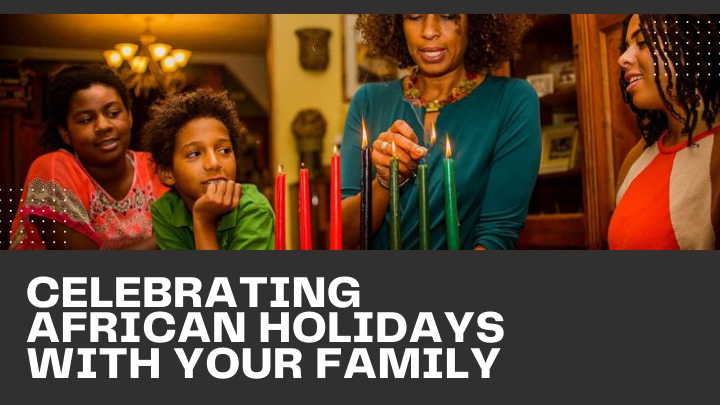Celebrating African Holidays with your Family
African holidays are rich in cultural significance, filled with vibrant celebrations, deep-rooted traditions, and meaningful connections to heritage. These holidays not only provide opportunities to honor African history, values, and spirituality but also offer a chance for families to bond, reflect, and create lasting memories. From Kwanzaa and Eid to national independence days, each celebration is an invitation to share joy, give thanks, and teach children the importance of cultural pride and community.
Here’s how to celebrate African holidays with your family, making each occasion both fun and meaningful.
1. Kwanzaa: A Celebration of African Heritage
Kwanzaa is a week-long celebration of African culture and heritage that is observed from December 26 to January 1. Founded by Dr. Maulana Karenga in 1966, Kwanzaa was created to inspire pride in African roots and heritage, especially among African Americans, but it can be celebrated by anyone looking to connect with African traditions. The holiday is centered around seven guiding principles known as the Nguzo Saba (The Seven Principles), which are Umoja (Unity), Kujichagulia (Self-Determination), Ujima (Collective Work and Responsibility), Ujamaa (Cooperative Economics), Nia (Purpose), Kuumba (Creativity), and Imani (Faith).
How to Celebrate Kwanzaa with Your Family:
- Decorate Your Home: Decorate your home with the colors of Kwanzaa—red, green, and black. These colors represent the struggle, the land, and the people of Africa, respectively. Use candles, fabrics, and African-inspired art to create a festive atmosphere.
- Lighting the Kinara: The Kinara, a candleholder with seven candles, is central to Kwanzaa celebrations. Each night, light a candle while reflecting on the corresponding principle. You can involve your children by teaching them about the meaning of each principle and encouraging them to share what each one means to them.
- Family Reflection: Each day of Kwanzaa focuses on one of the Seven Principles. As a family, take time to reflect on the principle for the day and discuss its significance. This is a great way to teach your children about African values and how to incorporate them into their daily lives.
- Family Feasts: Prepare a special Kwanzaa meal with traditional African dishes like Jollof rice, collard greens, or sweet potato pie. Share stories, songs, and dance, creating a festive, warm atmosphere where everyone is involved in the celebration.
Why This Is Meaningful: Kwanzaa teaches unity and encourages individuals to reflect on their personal and collective responsibilities to their community. It’s a wonderful way to connect with African heritage while nurturing values that promote togetherness, creativity, and purpose in everyday life.
2. Eid: A Time for Family, Giving, and Reflection
Eid, celebrated by millions of Muslims across Africa and the world, marks the end of Ramadan, the holy month of fasting. It is a time of joy, feasting, and giving thanks to God, as well as giving to those in need. Eid is celebrated differently across various African countries, but its core principles of gratitude, charity, and community are universal.
How to Celebrate Eid with Your Family:
- Attend the Eid Prayers: On the morning of Eid, families often gather at mosques or open fields to participate in a special prayer. Take the opportunity to explain the importance of prayer and reflection during Ramadan, and why Eid is a joyous occasion.
- Prepare a Feast: After a month of fasting, Eid is a time to indulge in food and share it with loved ones. Involve your children in preparing traditional dishes like biryani, sambusas, and kunafa. This can be a great opportunity to teach them about the significance of food in African cultures and the importance of sharing meals with family and community.
- Give Zakat (Charity): Eid is also a time for giving back. Teach your children the importance of charity by involving them in donating food, clothes, or money to those in need. This can be a meaningful tradition that helps them understand the value of helping others.
- Gift Exchange and New Clothes: A common tradition during Eid is wearing new clothes and exchanging gifts. Involve your children in picking out clothes, and consider giving them small, thoughtful gifts to mark the occasion. Make it a special time for family bonding.
Why This Is Meaningful: Eid teaches gratitude, compassion, and the importance of family. By celebrating Eid with your family, you help instill a sense of empathy and the joy of giving, while also teaching the significance of faith and devotion.
3. National Independence Days: Honoring Africa’s Journey to Freedom
Many African countries celebrate their independence days, marking the moment they gained freedom from colonial rule. These celebrations are often filled with national pride, reflecting on the struggle for independence, and honoring the leaders and activists who fought for the rights of the people. Whether it’s Nigeria’s Independence Day (October 1), South Africa’s Freedom Day (April 27), or Ghana’s Independence Day (March 6), these holidays provide a great opportunity to teach children about African history and the importance of freedom and self-determination.
How to Celebrate National Independence Days with Your Family:
- Learn About Your Country’s History: Research the history of your country’s independence and share it with your children. Discuss key historical figures and events that played a significant role in the liberation movement. This can help your children develop a deeper understanding of the struggles and sacrifices that led to independence.
- Participate in Local Celebrations: Many cities with large African populations will host parades, concerts, or community events to celebrate Independence Day. Take your family to these events to experience the music, dance, and food that make these celebrations so special.
- Cook Traditional Dishes: Prepare traditional dishes from your country to celebrate the holiday. Whether it’s fufu, suya, or bunny chow, food is an important part of African culture and a great way to share your heritage with your children.
- Reflect on Freedom and Unity: Use the occasion to reflect on the value of freedom and unity. Discuss with your children how important it is to honor the sacrifices of those who fought for independence and how they can contribute to their community and country in meaningful ways.
Why This Is Meaningful: National independence days are an opportunity to teach your children about their African heritage, history, and the importance of resilience and perseverance. It’s a chance to instill pride in their roots and help them understand the value of freedom and self-determination.
4. Other African Holidays and Festivals: A Rich Tapestry of Tradition
In addition to Kwanzaa, Eid, and national independence days, there are many other African holidays and festivals that offer a chance to celebrate and connect with your heritage. Some of these include:
- African New Year’s Celebrations: Many African countries celebrate the start of the new year with traditional festivals, music, and dancing. These events are often marked by communal feasts and rituals meant to bring good fortune for the year ahead.
- African Traditional Religious Festivals: Various African cultures celebrate religious holidays that are tied to indigenous beliefs, such as Odunde (celebrating Yoruba culture), Nwonyo (a festival of the Akan people), or Adamu (celebrating African spirituality). These holidays often include storytelling, music, and rituals to honor gods and ancestors.
- Harvest Festivals: Many African communities celebrate the harvest with festivals that include songs, dances, and dances to thank the gods for the abundance of crops. It’s an excellent way to teach your children about the importance of nature, agriculture, and gratitude.
How to Celebrate:
- Learn the Traditions: Each holiday has its own customs and traditions, so take time to research and teach your children about them. Whether it’s dancing to traditional drums or making crafts related to the festival, these activities can bring the holiday to life.
- Engage in Rituals: Many African holidays involve specific rituals such as honoring ancestors, offering sacrifices, or engaging in purification ceremonies. You can adapt some of these practices to your family’s celebrations, ensuring that the traditions are meaningful for your children.
Why This Is Meaningful: Celebrating a variety of African holidays exposes your children to the richness of African culture. By involving them in the activities and stories behind these holidays, you help them develop a deep connection to their cultural roots while celebrating the diversity and joy of African traditions.
Celebrating African holidays with your family is a powerful way to honor your heritage, teach children about their cultural identity, and create lasting memories. Whether it’s lighting the Kinara for Kwanzaa, enjoying a festive meal for Eid, or reflecting on the history of independence, these holidays offer opportunities to bond, reflect, and celebrate together. By involving your children in these celebrations, you are not only connecting them to African traditions but also giving them the tools to navigate and appreciate the diverse world they are growing up in.



